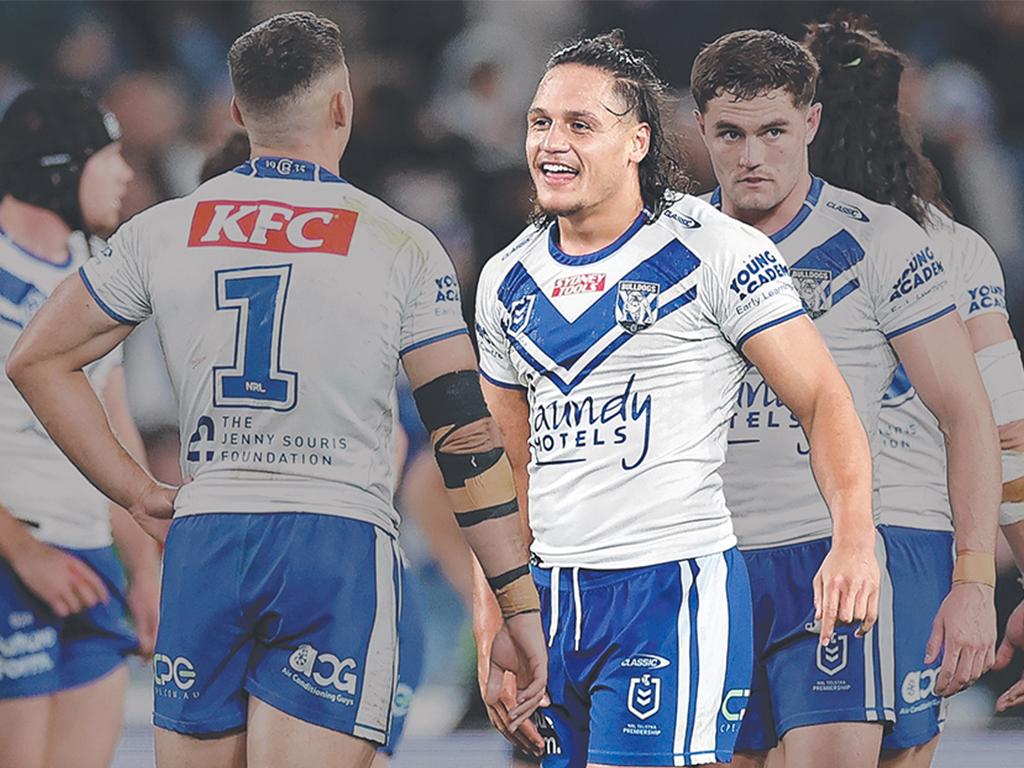Inside the Bulldogs wrestling session where Jackson Topine was ‘forced to wrestle squad’
Until now, the events of a Bulldogs wrestling session have been shrouded in mystery. According to one insider, the incident has the potential to be the biggest crisis for Canterbury since the Coffs Harbour gang rape allegations.
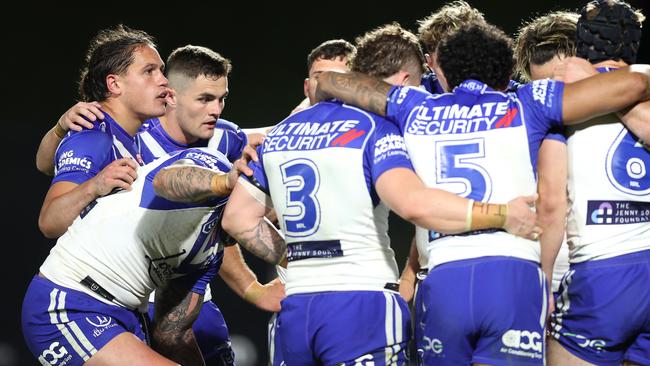
The young second-rower and his Canterbury-Bankstown Bulldogs teammates are already “cooked” when their gruelling 90-minute wrestling session comes to an end.
The players are eyeing the exits when they’re summoned back to the mats by the trainer, Canterbury’s Head of Performance, Travis Touma, who is not happy. He orders the entire squad to surround the young forward, a prodigious talent who captained NSW and Australia as a schoolboy.
The Polynesian youngster, who has 16 first-grade games under his belt and a long and lucrative career ahead of him, has no clue what is happening, nor why he’s been singled out. He’s standing on the mats of the jiu-jitsu gym before as many as 35 of his senior squad mates, bewildered. He has no idea he’s just been chucked into the tank as “shark bait” to be mauled by his fellow players.
It’s the morning of July 18, 2023, and the Bulldogs have endured a string of mortifying losses. Unrest is brewing among the senior players. Everyone is on edge as the losses mount. Reputations and livelihoods are on the line. The wooden spoon beckons.
Amid this tension ratcheted tight by failure, the order is given.
What happens next – according to an explosive statement of claim lodged in the NSW Supreme Court this week – amounts to Topine suffering “psychiatric injury, deprivation of liberty, humiliation, indignity, physical exhaustion, physical discomfort, anxiety, embarrassment and fear,” and the loss of his livelihood.
The first player comes in and wrestles him to the ground in a fair contest. Then another is coming at him. By the fourth or fifth, the young forward is exhausted and, as one of his teammates later tells us, from here on in “it wasn’t wrestling, it was humiliation”.
Yet he still has 30 men circling. Men, that court documents note, have “high levels of fitness and strength”. Collectively, they’re paid almost $12m a year for their brute power and skill.
On and on it goes in the wrestling dojo at Smeaton Grange, in Sydney’s southwestern extremities. Thirty seconds on, 30 seconds off.
Some of his teammates try to help the youngster up off the mat, but Touma allegedly screams, “Don’t let him up. If he’s down, jump on him straight away!”
“We would start on our feet and then we’d end up on our knees as well,” one teammate tells The Australian. “A lot of us boys, we were thinking, ‘This is a bit uncalled for’.” Another observes that the player could barely lift his arms to defend himself. “He was rooted,” says another teammate there that day. “It was like flogging a dead horse.”
Another friend says: “It got to the stage where he didn’t know where he was.”
When it’s finally done, the youngster can barely walk. Players clap gingerly, congratulating him for not giving up. Some move to check if he’s OK, but Touma is having none of it. “No, don’t congratulate him or help him,” Touma allegedly barks. “He deserved that. He was f..king late.”
That’s when the youngster realises he is being punished for an infraction he didn’t know he’d committed.
Club officials say that when he leaves the session he is “not upset”. An assistant coach says: “The kid seemed fine”.
But sitting in his vehicle – The Australian is told by a close friend – he harbours dire thoughts.
When he eventually walks through the door of his home, he bursts into tears, sobbing in the arms of his girlfriend and in front of his parents. “It was just a complete breakdown,” says his friend.
That night he calls a senior player, a fellow Polynesian. “He was distraught and crying,” this player says.
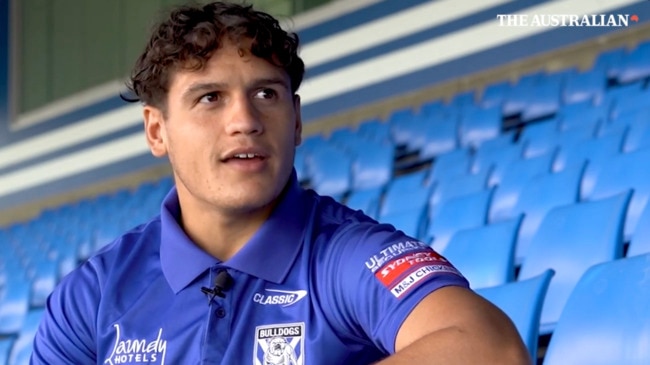
The youngster is Jackson Topine. And he has not played rugby league since.
Until this in-depth investigation by The Australian, the events of that last July day have been shrouded in mystery – limited to scant details of an unnamed player “walking out” on the club after having to wrestle 12 teammates for being late, sparking debate about whether the penalty is too tough or the kid is too soft.
Canterbury insists nothing is out of line.
Pugnacious football boss Phil Gould, The Australian has been told, briefs club directors that Topine finished the wrestling session “tired, but with a smile on his face”.
The Australian can reveal Topine alleges he was forced to wrestle “30-35” teammates in what his lawyers say amounted to “deprivation of liberty” that caused “psychiatric injury.”
In documents lodged in NSW Supreme Court, it’s alleged the conduct towards Topine by Canterbury and Touma was “unlawful detainment” of the young Maori player. He is seeking millions of dollars in damages, claiming the punishment has left him shattered and unable to play again.
The unprecedented lawsuit will raise difficult questions with highly subjective answers.
Rugby league is a brutal sport with head-on collisions between big, fast men risking irreparable brain injuries. Snapped limbs and busted cheek bones are an accepted occurrence. It’s not your average workplace.
But where is the line between testing physical and mental fortitude and bullying, assault and care for the wellbeing of an employee?
The club was justifiably determined to turn around its fortunes and an underperforming squad in the hands of a new head coach. The players could not have expected a light touch.
But did it go too far in the jiu-jitsu shed that morning?
The Canterbury Bulldogs will now have to respond to the legal proceedings over the treatment of Topine and the stakes for the club are high. “If this case goes to court,” says one player manager, “it’ll be the biggest thing since Coffs Harbour” – a reference to the 2004 gang-rape claims that brought the club to its knees.
The Bulldogs said it would not provide responses to questions “but will say that there are a number of allegations that we categorically deny”. It said some of the questions related to employee matters, which were “strictly confidential”, and that it stood by its internal review processes.
The club stressed it took the wellbeing of its players “very seriously”.
“We also take player welfare very seriously and place the best interests and welfare of our players and staff as our No. 1 priority,” a Bulldogs spokeswoman said in an email.
“As we do take mental health concerns very seriously and given the appropriate sensitivities that should be applied in matters concerning mental health, the club will not be making any comment at this time on any of the individuals at the centre of the allegations.” The incredible athletic talents of Jackson Topine (pronounced Toe-pin-ney) were first discovered deep behind enemy lines in AFL territory.
Chasing the dream
He was spotted as a teenager, rampaging through opposition teams on the fields of Perth’s northwest working-class suburbs.
Topine was born in Auckland but as a child moved to Perth, where his father, Marcus, a stevedore, took up a job on the wharves. His mother, Jodie, was the secretary of Ellenbrook Rabbitohs, a club at the heart of Perth’s Polynesian community. They’re a rugby league family to the core.
The great Australian second-rower Noel Cleal was working as a scout for his old mate, then Bulldogs coach Des Hasler, when he was sent to Perth to see what he could find. Cleal saw something of himself in young Jackson, with his power and speed and co-ordination. He was signed to the Bulldogs at 15 and the Topine family packed up their four kids and moved to Sydney so Jackson could pursue his NRL dream.
It was a savvy signing by Cleal as teenage Jackson lived up to all expectations. A few years after relocating, he was playing lock for the Australian Schoolboys – captaining a team that included the now Broncos superstar Reece Walsh, at fullback, Roosters playmaker Sam Walker at halfback and the gun Dolphin Hamiso Tabuai-Fidow in the centres.
In 2020, at just 19, he was named the Bulldogs’ Club Person of the Year for his “superb attitude and approach to being part of the squad at Belmore”.
“That was unreal,” Topine said. “I was going to the presentation dinner at the end of the year thinking I was going there for a free feed. To get the privilege and honour of receiving that award was unreal.”
Josh Jackson, then the Bulldogs captain, praised Topine: “He’s a good athlete and has a really good attitude. Nothing’s ever too hard for him … He’s just a really good club person. We’re really lucky to have him here.”
In 2021, Topine made his first grade debut, aged 20, and was presented with his guernsey in front of his proud mum and dad. “It’s a dream,” said a tearful Marcus. “And it’s comin’ true … I just want everyone to see how big his heart is.”
Topine praised his family for their unwavering support. And as for the club?
“I would go out there and die for the Bulldogs … especially being a junior for the club and coming up through the grades, it’s a feeling inside that you just love the club so much … I bleed blue and white.” When sought-after new coach Cameron Ciraldo arrived at Belmore last year, he was dissatisfied with the club song. He wanted a new tune. The players voted on someone who epitomised the team’s ethos to write their new anthem. They chose Topine.
Career at an end
Topine thought he’d arrived early at the gym. “He made a mistake in relation to reading the training schedule for 18 July, 2023, of ‘Arrive/strapping 8am’ then ‘Wrestle 8.30am’,” his statement of claim says. He arrived between 8.08am and 8.10am.
It was a mistake that would end his career. While he attended training the next day, and was picked as 18th man for the game that weekend, he didn’t play in that game and hasn’t played since.
The wrestling session at Seaton Grange was instructed by a specialist wrestling coach, overseen by Touma. Head coach Ciraldo, according to people who were there that day, was also at the gym.
In the days that followed, there was considerable unease among players about the way Topine was punished. “What the f..k was that?,” one said. “It was pretty ordinary. A lot of players didn’t want to do it.”
Some were angry that he’d been humiliated in such a public fashion, and that it was them, his peers, who were forced to administer the humiliating punishment. “We just feel like monkeys, to be honest,” another prominent player who was in the gym that day said. “ … we just listen to the boss.”
According to one account, the following days there was a “heated exchange” between the coaching staff – including Ciraldo and Touma – and the team’s welfare manager. “It seems some players must have said something (about Topine’s treatment),” this player said, apparently prompting the welfare manager to raise the issue with the coaching staff.
And then, the next week, Topine was nowhere to be seen.
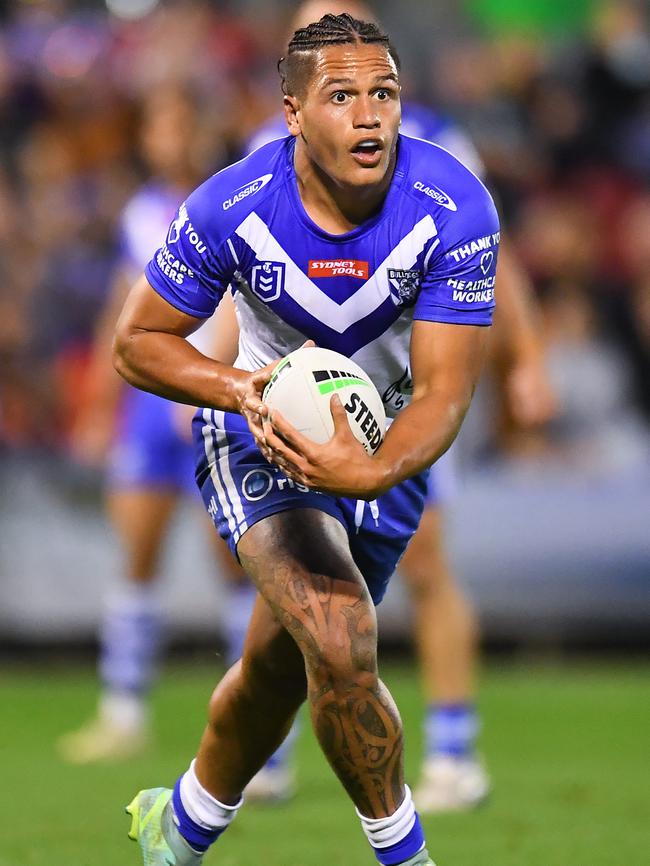
There are conflicting accounts about Topine’s mental state in the days after the incident. One of the club’s coaching staff told The Australian he phoned him “a couple of days after” the wrestling punishment and there was no “hint of drama”.
However a senior teammate said Topine called him the night of the incident and was in tears and terribly distressed. The following week he was granted extended sick leave.
The narrative from within the club was that Topine was fine until he got home and it was his father who got angry and “stirred up” the trouble. “He thinks they disrespected his son and humiliated him,” the club source said.
Several club sources told The Australian this version. It was also alluded to in media reports. “His mental health issues, which were not known then, were triggered by external reaction to his punishment,” said a column in the Sydney Morning Herald.
But as one player manager we spoke to said: “If a kid gets bullied at school – and keeps it together in front of his peers – and then goes home and breaks down in tears, it’s hardly his parents’ fault for getting angry.”
A friend of the family says: “His father was ropeable. His son came home and had a breakdown. Why wouldn’t he be?” The Australian was told Topine’s father sent an angry text message to the club in the days after the incident.
Marcus, Jackson and other members of his family declined to comment to The Australian.
Professor Jioji Ravulo, a University of Sydney academic who works with the NRL on cultural issues, said the treatment of Topine for punishment by the entire group was particularly humiliating from a Maori cultural perspective.
“It doesn’t just bring shame on the individual player, it brings shame to the family,” Ravulo said.
When scant details of the brutal session dribbled out in the weeks after, Canterbury insiders backgrounded the media that the punishment drill only lasted a bit over three minutes.
Gould played down the player’s exit. “It’s not as though he walked out after the event, he was still with the club for another week and then decided he needed to take some leave,” Gould said while being questioned on his own podcast, Six Tackles with Gus.
The Bulldogs had “kept in contact” with the player and provided “the very best of welfare and counselling and support”, Gould said. “As a club, we need to be very measured in our response because there are some very sensitive issues at stake here. The absolute priority is the welfare of the player involved.”
Gould defended Ciraldo, and the standards they were all “trying to enforce”. “It’s a club that has prided itself on hard work and hard (work) ethic,” Gould said.
“We want to instil those values and instil that training and work ethic, and it gets hard for some and it gets too hard for others. The ones that come out the other side are the ones you want to build your club around – and it’s as simple as that.”
Gould added: “I doubt this story goes any further if we all hold our peace.”
Canterbury’s backers came out in force, pushing the narrative the unnamed kid couldn’t handle the intensity of first-grade training.
Bulldogs life member Josh Morris indicated the young player had been “soft” and “this generation want to get paid as much as they possibly can for doing as little as they possibly can”.
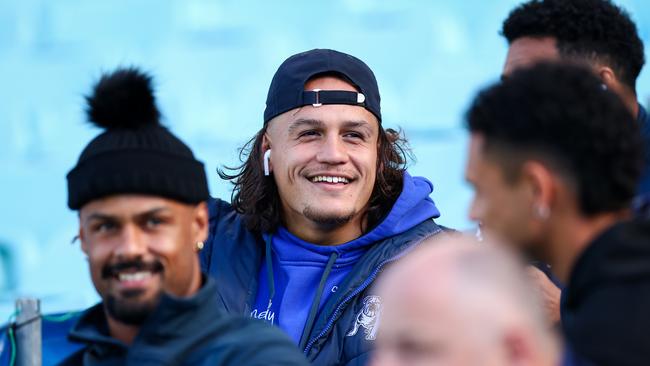
“When I played with (former Canterbury coach) Des (Hasler), we would wrestle non-stop and you would pretty much go until you couldn’t breathe,” Morris told 2GB.
He was backed by his former teammate James Graham: “They’re not running a forced labour camp, the players have a decision whether they want to be a footballer or not.”
All clubs have different regimes to uphold standards. The Australian has seen a photo of the Canberra Raiders’ “wheel of misfortune” that players spin to learn their punishment. It can include “three mins talk about yourself and family”, “three mins talk about what it means to be a Raider”, “clean recovery pools” and “junior reps training”.
Having to wrestle every player on the first-grade roster consecutively is not on the Raiders’ wheel.
Even recently, retired Bulldogs five-eighth Josh Reynolds said some players were not willing to buy into Ciraldo’s tough new system at Canterbury. “If you don’t like to work hard, it’s not for you. And this is what happened last year at the Dogs,” Reynolds said.
Willie Mason – employed by the club – distilled the thinking behind the new club culture on his Levels podcast.
“If you can’t f..king handle the way the Bulldogs play and train, this is not your f..king club.”
Unrest within squad
The wrestling incident came on the back of unrest within the squad with media reports of a text message “doing the rounds” that players were unhappy with the new coach, his tough regime and the long hours.
This issue came to a head early in the season when the club captain, Raymond Faitala-Mariner, was approached by “about 10 players”. The players were feeling “drained” – the training was one thing but many of them had young families, and the long days, often from 7am till 5pm, was starting to strain relationships at home.
In his job as club captain – to liaise between the players and the management – Faitala-Mariner, The Australian was told, approached Ciraldo with the concerns of the players. Ciraldo allegedly responded by saying: “If you, or any other player don’t like it, there’s the f..king door.”
It was the beginning of the end of Faitala-Mariner’s eight-year career at the club.
He was pushed out, along with many of the others who had approached him.
Faitala-Mariner is now playing with St George but some of the other players have found it difficult to get contracts as they’ve been labelled “soft” and “lazy” in media reports.
The trope pushed in media reports about Pacific players being lazy and not putting in the work is common in rugby league.
Ravulo first heard it when he began working with the NRL 15 years ago.
“There’s a narrative they just want to get on the field and play but they don’t want to train,” he said.
“But if you had one or two white players who were reluctant trainers, would you then apply that trope to all white players?”.
Ravulo said “there are different vibes (at each club) depending on management. Having good management fosters a good approach to cultural diversity.”
In January Faitala-Mariner was released from the final two years of his contract and the Bulldogs thanked him for his “positive” contribution and “hard work”.
Three months on from his wrestling punishment, the Bulldogs, “the Family Club”, quietly stopped paying Jackson Topine.
The kid was axed.
“That one moment cost him his career,” a Bulldogs club source said.
Focus on intensity
The focus on the intensity of rugby league training sessions has been sharpened in the wake of a coronial inquest into the death of 20-year-old Manly player Keith Titmuss. He suffered exertional heat stroke and died in November 2020 on the first day of training for the season.
Titmuss collapsed after a 2½-hour session, which concluded with a wrestling session in an overheated dojo.
Samoan international Josh Schuster recently told the inquest that that day was “the hottest he’s ever been”. He said he and Titmuss, his best friend, feared it would be held against them if they complained. Schuster felt they had no voice.
He watched on in horror as his friend’s life slipped away. Titmuss was screaming as his body went into a violent seizure for “seven to eight minutes” and he bounced around on his back, convulsing.
By the time an ambulance arrived, Titmuss’s core body temperature was still raging at 41.9C. Schuster held the hand of “Keithy”, his best mate since kindergarten, as paramedics methodically tried to stabilise him. He watched as they carted him off on a gurney. Schuster got the call that Titmuss died at Royal North Shore Hospital. His friend had effectively boiled to death.
The counsel assisting the coroner Adam Casselden SC said that the training session had been “unnecessarily and inappropriately tough, given it was the first extended training session of the new season”.
Schuster, who held the hand of his dying friend, has not been playing well this season. Manly showed him the door on Tuesday, making him a free agent without a club.
While debate has raged around whether the Topine session was excessively brutal and bullying – or that the kid just couldn’t handle the big time – it also raises the question of whether the players, particularly Pacific players, can speak up if they believe a line has been crossed.
A number of Pacific players told The Australian if they spoke out within their club, they’d be branded whingers – and that could ruin their career.
“Look what happened to Ray,” one said of Faitala-Mariner.
Pacific players fuel the NRL, providing nearly half its playing stock but scant few of its coaches, executives, administrators and support staff.
There’s no Polynesian on the board of the Rugby League Players Association, a cohort from which half the association’s members are drawn. The association this year did, however, set up the Mana Group to represent Maori-Pasifika interests.
This lack of representation, critics claimed to The Australian, leads to a lack of understanding. Ravulo said in the years he has been involved in the NRL, there have been some positive changes with more Pacific players in areas such as strength and conditioning and welfare, “but to be honest with you, it’s still done in silos and it doesn’t have a broader impact on structures and systems (of the game)”.
Ruthless operation
Phil Gould and his deputy Cameron Ciraldo have helmed a ruthless operation at the Dogs. They felt they needed to.
The proud old club won the wooden spoon three seasons ago as Gould was lured back as the saviour. Last year, with Penrith’s wunderkind assistant Ciraldo on deck as head coach, the side managed to limp ahead of the competition’s 2023 basket cases, St George and Wests Tigers, to finish third last.
From the moment Gould arrived in July 2021, he began blowing up the old team and rebuilding on scorched earth. Canterbury doesn’t have a single player left from the top-30 squad at his ascension.
No one has any doubts about who wields the axe. As one club insider told us: “Gus (Gould) has been given everything he’s ever asked for: new team, new coach, new chairman … it’s all on him now and if success doesn’t come soon, the knives will come out.”
Publicly, at least, the management and the board support the approach of Gould and Ciraldo.
Named as a defendant in this case along with the club, Touma – a physiotherapist – remains at the Bulldogs.
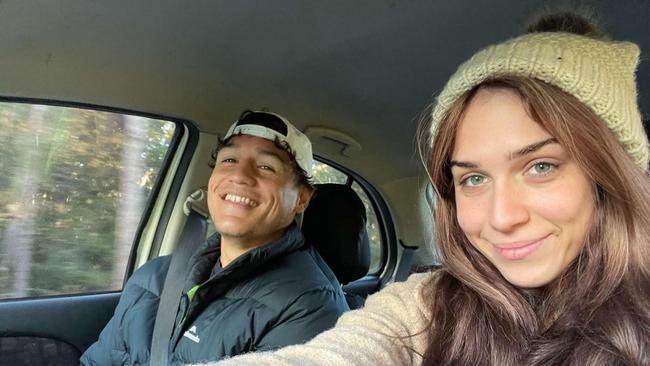
The obliteration and rebuilding of its playing stock, and the punishing training, is yet to convincingly reverse the Bulldogs fortunes. They’ve had three wins from seven games, and if they don’t make the finals this year, it will be viewed as failure.
Gould, so confident the tale of Jackson Topine would go no further if everyone held their peace, could now find himself in the harsh light of a witness box facing much more uncomfortable questions than he did on Six Tackles with Gus.
The proud family club faces a multimillion-dollar legal battle unprecedented in elite Australian team sport over a claim it ate one of its own.
Did a routine training session descend into the “humiliation, indignity, embarrassment and fear” for a kid who joined the club at 15 and bled blue and white?
And will there be implications for the way modern elite sporting teams train their athletes to perform at the extremes of physical and mental duress?
There is only one certainty: young Jackson Topine must now confront a new life, without football and the club he loved with all his heart.
“It’s been a struggle for him, to be honest,” says a friend. “It was all he ever wanted to do … but he’s slowly rebuilding.”
*Know more? Email the secure address gregbearup@proton.me

